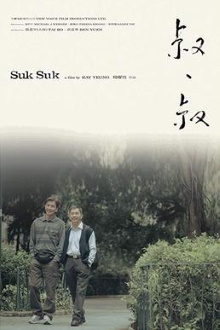While the more mainstream releases of Hong Kong’s cinema continues to fall to impress, we do get independent gems that worth our attention. Ray Yeung is a director who seems to have made a career out of highlighting homosexual issues and despite being himself gay and of Hong Kong nationality, this is his first film that is in Chinese and set in Hong Kong. I detect some inexpertness in the directing but the premise is both compelling and inarguably compelling.
Pak is an elderly taxi driver with a wife and two adult children and is constantly told that he should retire. He demurs, saying he can still work and earning more money is always good, but he actually also uses the time to cruise the local gay pickup locations. He is a closet gay and has hidden his homosexuality from his family throughout his entire life. At a park, he meets and befriends Hoi who is in a somewhat similar situation. In his case his wife divorced him long ago as he deliberately neglected her and he raised his now adult and married son by himself. As both of them are now well into their twilight years and their responsibilities towards their families are much reduced, they seem to feel that it is finally time to start living for themselves. Though they still hide their homosexuality from their families, they explore a loving relationship with each other and through them, we also catch a glimpse of the underground homosexual scene in Hong Kong.
Like all the best dramas, this one highlights a side of society that the general public wouldn’t think to look for and every detail of it feels authentic. Even with the topic of homosexuality so thoroughly explored in films and other media, this one proves that there are still many facets of the lives of homosexuals and their communities that are virtually unknown to straight people. We feel that the environment today is more permissive towards gays now but what must it have been like for those who lived almost their whole lives when things were less liberal and passed as straight that entire time. This film addresses this group of people and even surprised me with the in-hindsight obvious revelation that there are enough elderly, gay men in Hong Kong that they may need a retirement home of their own to fit their needs. It can be somewhat unsatisfying how there’s no real confrontation or dramatic moment of revelation for the families of Pak and Hoi, as we might expect to see in a Western film, but then this too might be more in keeping with how lives are actually lead in Asia. The film invites the viewer to believe that their families more or less suspect the truth but prefer to let things be by staying silent and saving face for everyone involved, and there’s nothing wrong with that at all.
I’m not convinced that the director’s skills are quite all the way there yet however. Many of the scenes consist of very quick cuts, making it impossible to build any sort of emotional rapport. Perhaps this is deliberate, emphasizing that Pak and Hoi are only really being themselves when they are with each other, as those shots are allowed to run long. But then it leaves something of a sour feeling if for example even Pak’s relationship with his granddaughter is considered part of the act of playing straight. Then there’s how the film seems to use religion as a kind of proxy for Pak’s commitment to their relationship. Hoi is a Christian but Pak is not and this leads to a rift between the two. It does make for interesting character development but I’m not sure that linking homosexual issues with religion is useful for the film.
I do like this film and, again, it’s wonderful how it highlights the existence of entire communities that are unknown to most of us. But this is one drama that I think could stand to be a little longer to provide a more complete picture of this unusual living arrangement.
